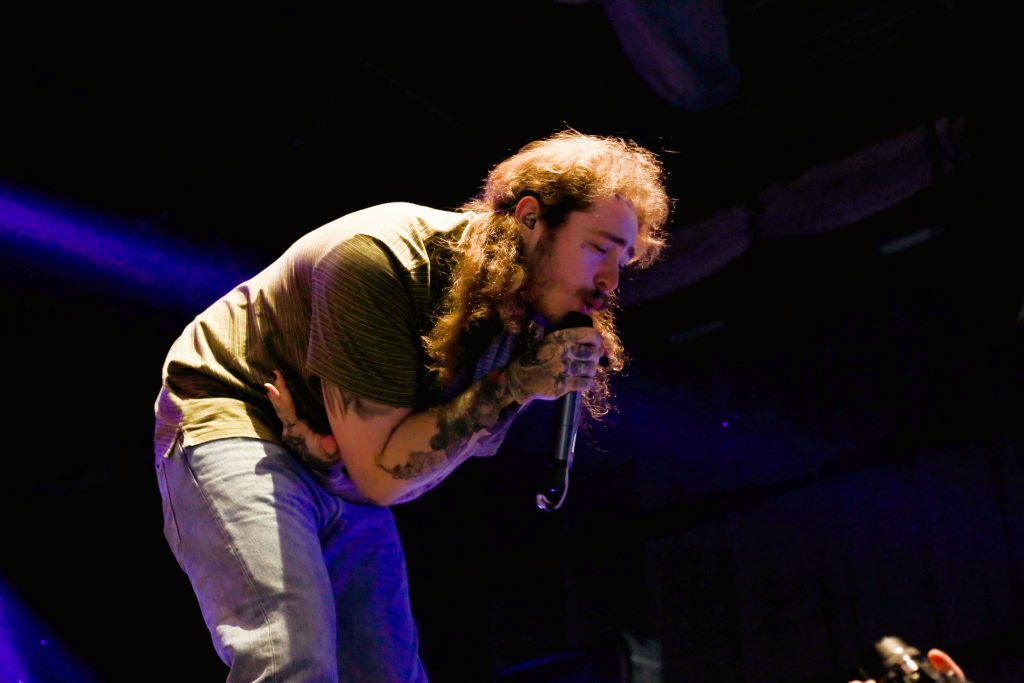
Hip-hop as an art form is one of black expression and experience, but this hasn’t stopped nonblack artists from participating. Artist such as the Beastie Boys, House of Pain and Eminem have done this in a way that was respectful of the art form and as a result, they are revered by many hip-hop historians. The same can’t be said for nonblack contemporary hip-hop artist Post Malone — an artist who the Student Association Programming Board (SAPB) brought to campus in the fall.
This past year, Post Malone was one of the hottest artists, breaking Apple’s single-week streaming record with over 25 million streams for his song “rockstar,” featuring 21 Savage. That same song reached No. 1 on Billboard’s Hot 100 chart. Contrary to these great achievements, Post Malone has faced criticism for his perspective on the hip-hop genre as a whole. In an interview with Polish outlet Newonce, Malone stated: “If you’re looking for lyrics, if you’re looking to cry, if you’re looking to think about life, don’t listen to hip-hop,” he said to Newonce. “[W]henever I want to sit down and have a nice cry, I’ll listen to some Bob Dylan. But whenever I’m trying to have a good time and stay in a positive mood, I listen to hip-hop because it’s fun. I think hip-hop is important because it brings people together in a beautiful, happy way. Everybody’s happy.”
In one sense, he is praising hip-hop by essentially calling it happy music, but in doing so he classifies it as one-dimensional. Additionally, the first half of his statement is very telling. Post Malone’s statement that if a person is looking to actually feel something that they shouldn’t listen to hip-hop takes on a deeper meaning when you understand that he makes hip-hop music. While he does perform other genres of music, Malone is widely known for hip-hop songs like “rockstar,” “Congratulations” and “White Iverson.”
This statement exhibits a striking contrast of what is considered good and bad artistry. In this statement, he not only said that black artistry is devoid of emotion, but that it is devoid of emotion in comparison to white artistry. White artists, like Bob Dylan, can evoke feelings but black artists cannot, according to Post Malone. It also shows that he doesn’t relate to hip-hop music as much as it may seem he does, that he hasn’t listened to enough hip-hop and is still not listening to enough hip-hop. Songs such as “Dear Mama” by 2Pac or “I’ll Be Missing You” by Puff Daddy are examples of classic hip-hop songs sure to evoke feelings. Contemporary hip-hop artists also discuss deep subject matter. Songs like “Jocelyn Flores” by XXXTENTACION and “Devastated” by Joey Badass are examples of songs that cover topics such as losing a loved one and fear of failure, respectively.
It is extremely hard to not see his place in hip-hop as anything but cultural appropriation. Post Malone obviously has no knowledge of hip-hop and doesn’t care about the art form as a whole. In a two-minute Twitter video, the rapper has explained his behavior, stating he was drunk during the interview and that he “loves hip-hop.”
“What I was saying was that when I wanna sit down and cry, I sit down and I listen to Boy Dylan and his guitar,” he said in the video. “My last hip-hop album was f— hip-hop. My next hip-hop album is f— hip-hop. I love hip-hop. I make hip-hop. I wanna take this genre and stretch it so far that people who may not listen to it listen to it, and want to listen to the new artists and whatever’s going on.”
This response never addresses his initial claim that you shouldn’t listen to hip-hop to feel something and never asserts that hip-hop is more than happy music. Combining the popularity of hip-hop with his privilege as a white male allows Post Malone to profit off of a genre that he doesn’t truly understand.
By inviting artists like Post Malone for concerts, the SAPB shows an insensitivity toward hip-hop culture, a culture synonymous with black people. Post Malone doesn’t contribute to this culture in any way, so why have him here? The SAPB has made the right decision in the past, inviting artists like Mac Miller (a white rapper who respects hip-hop), Big Sean and J. Cole to perform on campus. Why couldn’t they do the same for the fall concert? For this semester’s Spring Fling, let’s hope they do better.
So Post Malone can get a better understanding of hip-hop, we’ve put together a list of hip-hop songs that will help him “feel something.” If you’d also like to listen, follow PRISM on Spotify.
Tykeem Banini is an undeclared freshman


